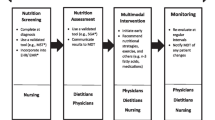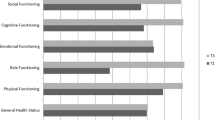Abstract
Purpose
To establish a multidisciplinary Cancer Nutrition Rehabilitation Program (CNRP) for the management of the anorexia–cachexia syndrome (ACS) in an Australian cancer center and to evaluate outcomes of 2 months participation in the CNRP
Method
Patients were eligible if they had significant anorexia/weight loss, identified by their oncologist or the Malnutrition Screening Tool. In the 9 months that funding was available, 54 participants (37 males, 17 females; median age, 62 years) enrolled. They had mainly lung or gastrointestinal cancers, with 67% receiving chemotherapy concomitantly. Baseline assessments of nutrition and physical status were: median weight 62.7 kg, median weight loss 10.2%, median BMI 21.2 kg/m2, and 78% malnourished according to PG-SGA. Median baseline Karnofsky performance score (KPS) was 70%, with reduced right-hand grip strength (RGHS; median, 27 kg) and endurance (median, 6 min walk test 6MWT 442 m). Patients received individualized nutritional interventions, exercise programs, and symptom management and were followed prospectively for up to 6 months.
Results
Twenty-five (58%) of 41 evaluable CNRP participants attended the 2-month follow-up. Median weight (63.4 kg), KPS (80%), endurance (6MWT 570 m), and strength (RGHS 28 kg) were all improved. Edmonton symptom assessment scores (36 vs 27) and C-reactive protein levels (39 vs 22) fell. Participants were significantly more likely to return for re-evaluation if at baseline they were having anticancer therapy (odds ratio [OR] 4.7, 95% confidence interval [CI] 1.3–16.2) or could walk >420 m in 6 min (OR 21, 95% CI 1.9–227).
Conclusion
A CNRP may be beneficial for patients with advanced cancer and the ACS, but identification of patients who are likely to stay on the program is needed.



Similar content being viewed by others
References
Read JA, Choy STB, Beale P et al (2006) An evaluation of the prevalence of malnutrition in cancer patients attending the outpatient oncology clinic. Asia-Pacific J Clin Oncol 2:80–86
Dewys WD, Begg C, Lavin PT et al (1980) Prognostic effect of weight loss prior to chemotherapy in cancer patients. Eastern Cooperative Oncology Group. Am J Med 69:491–497
Stephens NA, Skipworth RJ, Fearon KC (2008) Cachexia, survival and the acute phase response. Curr Opin Support Palliat Care 2:267–274
Lee BN, Dantzer R, Langley KE et al (2004) A cytokine-based neuroimmunologic mechanism of cancer-related symptoms. Neuroimmunomodulation 11:279–292
Slaviero KA, Clarke SJ, Rivory LP (2003) Inflammatory response: an unrecognised source of variability in the pharmacokinetics and pharmacodynamics of cancer chemotherapy. Lancet Oncol 4:224–232
Vigano A, Watanabe S, Bruera E (1994) Anorexia and cachexia in advanced cancer patients. Cancer Surv 21:99–115
Bauer JD, Ash S, Davidson WL et al (2006) Evidence based practice guidelines for the nutritional management of cancer cachexia. Nutr Diet 63:S3–S32
Dy SM, Lorenz KA, Naeim A et al (2008) Evidence-based recommendations for cancer fatigue, anorexia, depression, and dyspnea. J Clin Oncol 26:3886–3895
MacDonald N (2003) Is there evidence for earlier intervention in cancer-associated weight loss? J Support Oncol 1:279–286
MacDonald N (2007) Cancer cachexia and targeting chronic inflammation: a unified approach to cancer treatment and palliative/supportive care. J Support Oncol 5:157–162, discussion 164-6, 183
MacDonald N, Easson AM, Mazurak VC et al (2003) Understanding and managing cancer cachexia. J Am Coll Surg 197:143–161
Fearon KC (2008) Cancer cachexia: developing multimodal therapy for a multidimensional problem. Eur J Cancer 44:1124–1132
Chasen MR, Dippenaar AP (2008) Cancer nutrition and rehabilitation—its time has come! Curr Oncol 15:117–122
DeMille D, Granda-Cameron C (2008) Abstract PA-01. Patients with cancer cachexia benefit from multidisciplinary team management. J Support Oncol 6:334
McMillan DC, Elahi MM, Sattar N et al (2001) Measurement of the systemic inflammatory response predicts cancer-specific and non-cancer survival in patients with cancer. Nutr Cancer 41:64–69
Barber MD, Ross JA, Fearon KC (1999) Changes in nutritional, functional, and inflammatory markers in advanced pancreatic cancer. Nutr Cancer 35:106–110
Ferguson M, Capra S, Bauer J et al (1999) Development of a valid and reliable malnutrition screening tool for adult acute hospital patients. Nutrition 15:458–464
Bauer J, Capra S, Ferguson M (2002) Use of the scored Patient-Generated Subjective Global Assessment (PG-SGA) as a nutrition assessment tool in patients with cancer. Eur J Clin Nutr 56:779–785
Forrest LM, McMillan DC, McArdle CS et al (2003) Evaluation of cumulative prognostic scores based on the systemic inflammatory response in patients with inoperable non-small-cell lung cancer. Br J Cancer 89:1028–1030
Bruera E, Kuehn N, Miller MJ et al (1991) The Edmonton Symptom Assessment System (ESAS): a simple method for the assessment of palliative care patients. J Palliat Care 7:6–9
Mor V, Laliberte L, Morris JN et al (1984) The Karnofsky Performance Status Scale. An examination of its reliability and validity in a research setting. Cancer 53:2002–2007
Morris GS, Gallagher GH, Baxter MF et al (2009) Pulmonary rehabilitation improves functional status in oncology patients. Arch Phys Med Rehabil 90:837–841
Cassell JA (1995) Social anthropology and nutrition: a different look at obesity in America. J Am Diet Assoc 95:424–427
Thorburn AW (2005) Prevalence of obesity in Australia. Obes Rev 6:187–189
Courneya KS, McKenzie DC, Mackey JR et al (2008) Moderators of the effects of exercise training in breast cancer patients receiving chemotherapy: a randomized controlled trial. Cancer 112:1845–1853
Courneya KS, McKenzie DC, Reid RD et al (2008) Barriers to supervised exercise training in a randomized controlled trial of breast cancer patients receiving chemotherapy. Ann Behav Med 35:116–122
Fainsinger RL, Pereria J (2004) Clinical assessment and decision-making in cachexia and anorexia. In: Doyle D, Hanks G, Cherny N et al (eds) Oxford textbook of palliative medicine (ed 3rd). Oxford University Press, Oxford, UK, pp 533–546
Acknowledgment
The authors acknowledged the financial support of the New South Wales Cancer Institute’s Health Services Innovation Grant program in funding this project.
Author information
Authors and Affiliations
Corresponding author
Rights and permissions
About this article
Cite this article
Glare, P., Jongs, W. & Zafiropoulos, B. Establishing a cancer nutrition rehabilitation program (CNRP) for ambulatory patients attending an Australian cancer center. Support Care Cancer 19, 445–454 (2011). https://doi.org/10.1007/s00520-010-0834-9
Received:
Accepted:
Published:
Issue Date:
DOI: https://doi.org/10.1007/s00520-010-0834-9




